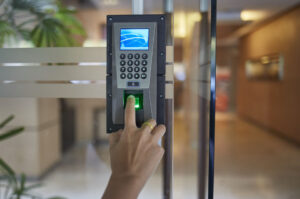Access Control System: Transforming Security in MEP Construction

In the contemporary age of MEP construction, providing strong security and effective management of facilities is most crucial. Among the best solutions for this purpose is the introduction of an Access Control System in MEP Construction. It not only improves security but also fits well with the infrastructure, making it a major element in MEP services.
What is an Access Control System?
An Access Control System (ACS) refers to an anti-theft device that controls who can enter or leave specific areas of a building or facility. Contrary to standard locks, the system may be programmed to suit varying levels of access, admitting only authorized persons to desired areas.
Access control is necessary in Mechanical, Electrical & Plumbing (MEP) work because these areas hold crucial equipment and systems that need to be closely monitored.
Significance of Access Control in MEP Engineering
MEP in engineering comprises designing, installing, and maintaining a building’s mechanical, electrical, and plumbing systems. Because these systems are essential to a facility’s operation, it’s crucial to secure them from unauthorized entry. Here’s why access control is significant in MEP civil engineering projects:
Increased Security : Vulnerable MEP equipment, including HVAC, electrical panels, and plumbing controls, should be safeguarded against tampering or physical damage.
Efficiency of Operations : Access control systems assist in monitoring staff movements, whereby trained personnel only perform intricate MEP services tasks.
Compliances to Rules and Regulations : Most engineering standards demand limited access to essential mechanical and electrical systems, such that ACS becomes a must in MEP construction.
Audit Trails: Contemporary systems enable comprehensive record of entry and exit, helpful for maintenance planning and security audits.
Types of Access Control Systems
Access control systems may be of varied complexity, and selection depends on the size of your MEP civil engineering project:
Card-Based Access : Utilizes ID or RFID cards to permit entry. Suitable for offices and equipment rooms.
Biometric Access : Fingerprint, facial recognition, or iris scanning provides high-level security, ideal for sensitive mechanical or electrical areas.
PIN or Password-Based Access : Convenient but efficient for small buildings or temporary access areas.
Mobile or Cloud-Based Systems : Advanced solutions integrated with MEP in engineering projects for real-time monitoring and remote management.
Integration with MEP Services
Under MEP construction, the integration of an access control system with building management systems (BMS) enables improved operational control. Integrated examples include:
Mechanical Systems : Adjustments in HVAC or plumbing systems are made by authorized persons only.
Electrical Systems : Access to electrical panels or server rooms is regulated to avoid accidents and unauthorized changes.
Plumbing Systems : Sensitive water and drainage systems in commercial or industrial environments are protected.
Benefits of Implementing ACS in MEP Civil Engineering
Safety : Shields staff and sensitive equipment.
Accountability : Keeps tabs on staff movement for maintenance and security reasons.
Efficiency : Minimizes the necessity for manual supervision and key management.
Scalability : Can scale with your MEP services requirements, and add new buildings or floors.
Conclusion
Implementation of an Access Control System is no longer a choice in MEP construction processes today. Right from upgrading security to increasing operational efficiency in Mechanical, Electrical & Plumbing systems, ACS is a critical component of MEP civil engineering. When access control and MEP are integrated in engineering, facilities can provide safety, regulatory compliance, and best management of their critical infrastructure.


